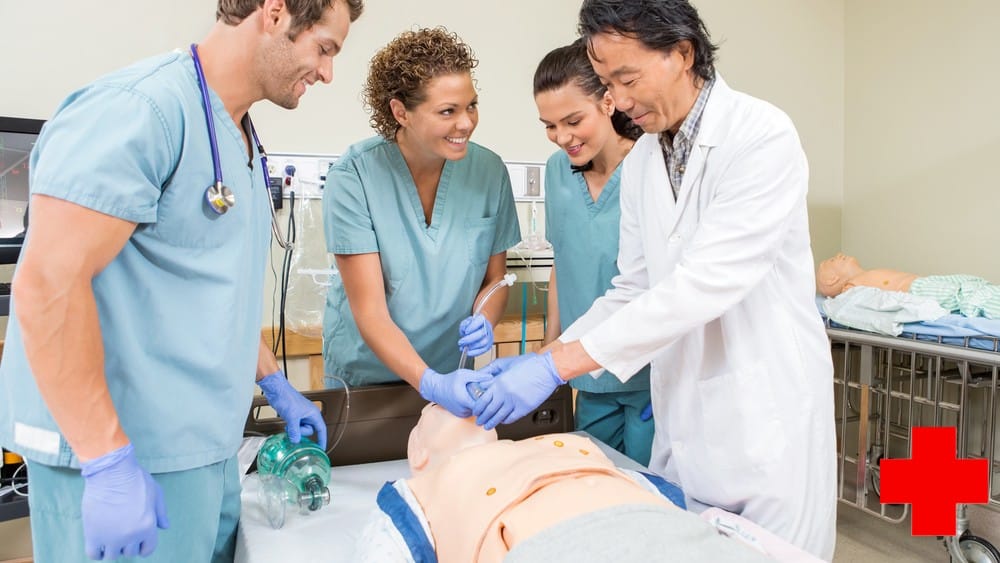Hey there, welcome to this informative article that provides answers to What Does A CNA Do In A Hospital?
At the end of reading this article, you’ll get full insight into the tasks of a CNA working in a hospital environment and what to expect if you happen to work in a hospital as a CNA.
In this article, we will cover the following:
- CNA scope of practice
- CNA hospital duties and roles
- Important communication tips for CNAs working in a hospital
- Answers to your pressing questions about hospital CNA jobs
Here we go!
CNA Scope Of Practice

Certified Nursing Assistants play a very important role in the healthcare system because they provide basic care for patients and work in hospitals, long-term residential facilities, rehabilitation centers, nursing homes, adult daycare centers, and other relevant facilities.
However, our focus today lies in CNA tasks in hospitals.
CNAs spend a lot of time with the patients, so most of them will have to possess a fondness for people and the right attitude to help people in need and depend on them for basic care.
Most CNAs are compassionate, kind, and empathetic people capable of building real emotional connections with their patients.
Every state certification board has this important list of tasks and job duties that CNA/Nurse Aide should legally do, and these activities describe the scope of practice.
CNAs are not allowed to carry out tasks outside their scope of practice because when they do, they become liable for any harm to a patient and risk losing their certification.
This is why there are well-defined roles and duties of a CNA in every setting, and a hospital setting, is no different.
Duties Of A CNA In A Hospital

There are various roles and duties of CNAs who work at a hospital, and they are as follows:
Taking Vital Signs
The certified nurse assistant must take a patient’s vital signs, including temperature, heart rate, blood pressure, and respiratory checking.
The CNA is expected to document the findings of these checks and immediately let the doctor or nurse know if something seems abnormal.
This direct patient contact also allows the CNA to identify bruises, injuries, blood in urine, and other unusual symptoms and report them to the medical team, who can initiate the treatment process.
Physically Help Patients
CNAs must know how to safely move patients into wheelchairs, beds, or onto exam tables when they cannot do it themselves.
They must also know how to turn bedridden patients into different positions in bed for their comfort and prevent them from experiencing bedsores from lying in one position.
They will also help the patient get up and walk to the bathroom, bathe them and even dress them and move around when they need to.
They will also help patients with other daily living activities such as shaving, trimming their nails, brushing their teeth, eating, and dressing up when they cannot do all these things for themselves.
Ensuring Clean And Sanitized Surroundings
CNAs must ensure that the rooms and surroundings of the patients they care for are clean and orderly.
CNAs will have to change the soiled linens, clean up any spills, change bedpans, set up equipment, and properly sanitize the patient’s surroundings to limit the spread of germs and infection.
This is slightly different from the regular cleaner’s duties because the CNA will also check on the patient as they clean their surroundings and observe them, noting any unusual behaviors.
Some patients love chatting, and having a friendly person nearby will help them air any concerns that they might have easily.
Serving And Monitoring Patients Meals
Some patients require strict monitoring of their meals.
It is up to the CNA to ensure that the patient takes the right portions of food and foods with the proper nutrition.
They must also note how much or how little the patient takes.
In the process, they must also monitor the patient’s fecal or urine output.
Helping With Some Medical Procedures
CNAs have been trained to help doctors and nurses with various physical tasks during medical procedures.
Such tasks include getting medical equipment ready and preparing patients for any diagnostic exam.
Sometimes the CNA might even dress the patient’s wounds and ensure that the dressings are changed and the wounds are cleaned every day to ward off infections.
Helping With Administrative Tasks
CNAs in hospitals also help with administrative tasks such as patient monitoring, answering phones, and data entry.
These kinds of tasks might require additional training.
It is not unusual to find CNAs serving in this capacity in some hospitals.
Offering Companionship And Friendship
Since CNAs spend a lot of time with their patients, they might need to offer encouragement, show compassion and comfort the patients who feel scared, lonely, or frustrated.
They might also need to answer patients’ calls for anything from opening a package to just being there for companionship.
In most cases, a warm and compassionate human touch is all the patient needs.
This often speeds up their recovery or makes their days brighter.
The nature of the work often results in CNAs bonding with their patients.
They familiarize themselves with their patient’s moods and behavior, so they are often the first to notice any changes that might occur.
This is helpful because even before the patient complains about any symptoms, the CNA will have noticed them, then take a closer look and communicate the unusualness to the healthcare team.
We have seen the important roles that CNAs carry out in a hospital setting.
This is why every hospital needs competent and professional CNAs as part of the healthcare team.
This makes all processes go smoothly, and every team member carries out their responsibilities effectively.
In the end, it is the welfare of the very important client, and in this case, it is well looked after.
With patients’ interests adhered to, their trust in the hospital system skyrockets, contributing to making their lives better and their health improvement tremendous.
Important Communication Tips For CNAs Working in a Hospital

As a CNA, you will spend a lot of time working closely with patients, and effective communication is key to them; the healthcare team and their loved ones are very important.
You can use the following communication tips to hone your communication skills and make your hospital work environment more enjoyable even after changing the working environment to a home care one, for example.
Learn To Read Body Language
The body language of a patient is always very important.
It is a key non-verbal cue, especially for patients who are incapable of speaking.
It is also key for patients who are in pain but, for some reason, they don’t want to speak.
This will help you offer the best help possible.
Understanding the body language of the people who work on the healthcare team you are on, especially your superior, is essential and can help you carry out your CNA role in hospital settings.
Always Listen Carefully
Most times during conversations, you probably wait for your turn to speak and always plan the things you are going to say.
However, this is not a true and effective conversation, and in most cases, it always ends up in confusion or miscommunication.
You must always listen carefully to the person you are conversing with first before preparing what you will say.
This will help you not only at work but also in your life.
A CNA who can listen intently is an excellent asset in whatever working environment because they will be more effective in their job.
Listening intently can also save lives in a great way.
Over-communicate but maintain Conciseness
It is important to maintain conciseness during communication with anyone you are working with.
Thanks to most people lacking the listening gift, you might find people not really understanding what you are saying but always ready with a responding statement.
As you watch someone you are communicating with; it is important to emphasize why the point you are trying to drive home is crucial.
Drill the point home if you have to.
A good example is when you are updating a patient’s chart with important information.
Consider using bold or italics as a great way of over-communicating the importance of the update.
If you are sending an important email, highlight the importance in the subject line and the body copy.
Put Things Down On Paper
As a CNA working in a busy hospital environment and gaining important information, it is always important that you take notes regularly.
Taking notes will give you the impression that you are listening intently, but the notes will also become a valuable resource, especially if you attend to several clients.
You will hardly forget important details about a patient.
Always Consider Your Audience
Considering your audience is always very important.
How you speak to your superiors and how you speak to your patients should be different.
You may also consider other factors like age, ailments, gender, and other factors.
Learn to always speak effectively to different audiences.
Knowing who your audience is and knowing the right way to speak is always important.
Conclusion

Becoming a CNA is a great opportunity and a good stepping stone to becoming a registered nurse or pursuing other healthcare areas.
If you are interested in furthering your healthcare career, having the CNA certification and gaining experience in in-patient care is a step in the right direction.
The hospital work environment offers the best learning experience for you as an entry-level professional in the healthcare sector.
We have looked at the duties of a CNA at a hospital and important communication tips.
With the right attitude and determination, you will eventually experience a rewarding career in nursing and end up in nursing management and leadership.
FAQs

What do CNAs do in hospitals?
The CNAs are very resourceful and play an important role in in-patient care in a hospital environment. They are usually involved in every aspect of patient care, such as feeding, cleaning, moving bedridden patients, responding to calls, and checking vital signs in the patients.
What does a CNA do in a hospital vs nursing home?
The hospital environment is fast-paced and offers the CNAs to work alongside healthcare teams during emergencies such as CPR administration and so on. On the other hand, the nursing home is a slower-paced work environment where the CNAs focus on helping patients carry out daily living tasks.
What’s the next step up from a CNA?
You can pursue an LPN course or become a licensed vocational nurse(LVN). According to the bureau of labor statistics, the demand for LPN or LVN professionals will grow by 12% between five to seven years. Therefore, you will have opportunities to be part of this exciting career.
Can a CNA work in a hospital?
Yes, a CNA can work in a hospital because they are trained to carry out all aspects of patient care, such as moving patients, preparing medical equipment, feeding, and checking vital signs, among other duties. The hospital environment is the best way to hone their skills and prepare them for the next career path.
What type of CNA gets paid the most?
According to the Bureau of Labor Statistics, the highest-paid CNAs work in hospitals because their average pay is $14.73 hourly. Specialized CNAs also earn higher earnings, and the highest-paid specialties for CNAs are the operating room, ICU, emergency, telemetry, medicine, and surgery.
Is it better to be a CNA in a hospital or nursing home?
CNA job opportunities in hospitals are few for new CNAs. However, if you have no work experience or have very little, it is easier to find steady employment in nursing homes. Still, the hospital environment offers you extraordinary experiences which will come in handy should you consider advancing your career.
What Are the Requirements to Work as a Hospital CNA?
As per the Bureau of Labor Statistics(BLS) recommendations, you must complete one of those approved CNA training programs offered in high schools, community colleges, and the Red Cross. You must take a competency exam by your state and pass.









